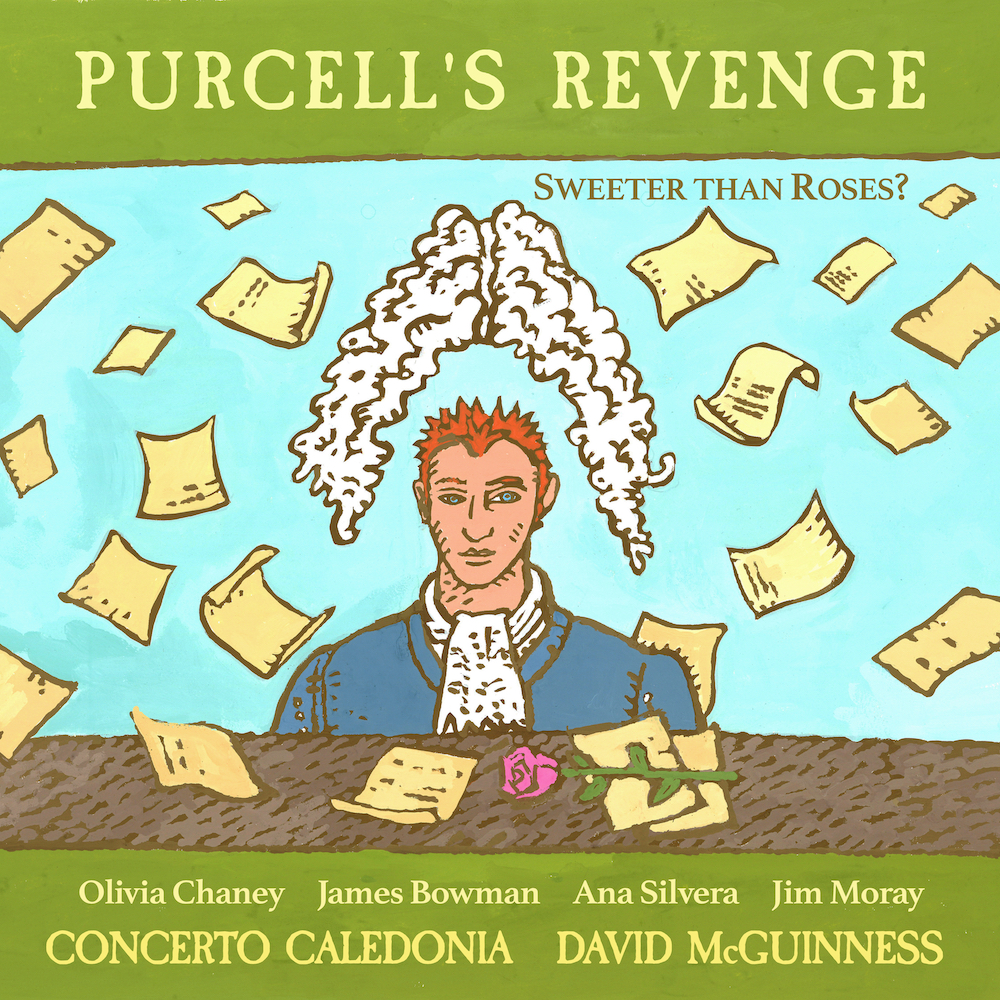
Purcell's Revenge
withOlivia Chaney - James Bowman
Ana Silvera - Jim Moray
The Revenge team are back, and this time it's Purcell. Explorations, investigations and odd tangents from the music of Henry Purcell, with something to delight and offend nearly everyone.
"To say that Concerto Caledonia's album veers between maddening and utterly joyous is to put them well ahead of the curve." Gramophone
"It's like an evening round at Purcell's house: HP would have loved it." Catherine Bott
"It’s irreverent, a bit dirty and a lot more fun than decent." Norman Lebrecht
more on youtube
Purcell's Revenge: Sweeter than Roses?
Olivia Chaney : James Bowman : Ana Silvera : Jim Moray
Concerto Caledonia / David McGuinness
Pamela Thorby - recorders
Clare Salaman - nyckelharpa, hurdygurdy
Bill Taylor - harps
Susanna Pell - bass viol
Alison McGillivray - lyra d’amore, violone
David McGuinness - harpsichord, dulcitone, organs
with Will Pound - harmonica
Recorded on 1 April 2013 in the Britten Studio, Snape
Parts of tracks 5 and 21 recorded live in concert on 30 March 2013 at the same venue
Producer & editor: David McGuinness
Recording engineer: Matt Parkin
Mixing & mastering: Calum Malcolm
Programme research: Aaron McGregor
Tracks 2 and 16 published by Warner Chappell
Paintings by Joe Davie
Thanks to:
Aaron McGregor for tireless research and notation preparation
Dan Whitfield, Bill Lloyd, and the whole team at Aldeburgh Music
Arts Council England
No thanks to:
the UK Home Office who made us take our passports to Aldeburgh to prove that we were British enough to play this music. This is ironic given that the whole purpose of the programme was to show the cultural diversity of Purcell’s London. Immigration is just as much the key to healthy and exciting cultures now as it was then.
1
Moonlight On The Green (variation by James Oswald)
Scotch Tune (Amphitryon, Z572)
We start with James Oswald’s variation from The Caledonian Pocket Companion, vol. 4 (c. 1760), before hearing the original tune as set by Purcell.
Pamela soprano baroque recorder
Clare nyckelharpa
Alison lyra d’amore
Zan bass viol
David harpsichord
Bill hook harp
Jim acoustic guitar
Olivia harmonium
2
There’s Not A Swain On The Plain (Rule a Wife and Have a Wife, Z587)
arr. Olivia Chaney
The 3/2 Hornpipe from the first act of The Fairy Queen became a song in a 1690s revival of John Fletcher’s Rule a Wife and Have a Wife. Fletcher called for a song in the play-text, when the heiress Margarita is discovering that her ideal husband may not be so ideal after all, but he didn’t provide the words.
Olivia voice, guitar
Pamela alto ‘Ganassi’ recorder
Bill hook harp
David reed organ, harpsichord
Clare nyckelharpa
Zan bass viol
Alison violone
Jim electric guitar + POG
3
Rondeau (Abdelazer, Z570)
Britten knew exactly what he was doing when he chose Purcell’s Third Act tune from Abdelazer to be the basis of his Young Person’s Guide to the Orchestra. It acts as an attention-grabbing curtain raiser which is also complex enough to bear repeated listening: in fact, it has all the attributes of an effective TV signature tune.
Pamela soprano ‘Ganassi’ recorder
Clare nyckelharpa
Zan bass viol
Alison violone
Bill hook harp
David harpsichord
4
An Evening Hymn, Z193
arr. Ana Silvera
This devotional hymn had pride of place as the first piece in Henry Playford’s Harmonia Sacra, or Divine Hymns and Dialogues of 1688. Purcell is well known for his skill and invention with ground basses, but what you hear in this version is what can happen when you take the ground bass away.
Ana vocal
David dulcitone
Bill hook harp
Olivia reed organ
Pamela tenor recorder (Takeyama)
Clare nyckelharpa
Alison lyra d’amore
Zan bass viol
5
Fantazia in Four Parts No. 11 in G, Z742
Purcell’s Fantazias for viols seem to have been a very personal exercise for him, sometimes reworking his own musical material in an essentially private rather than a public manner. In his meticulous manuscript score he dated every piece, this one on 19 August 1680.
Pamela tenor Renaissance recorder
Clare nyckelharpa
Alison lyra d’amore
Zan bass viol
David organ
Bill hook harp
Olivia dulcitone
6
A New Scotch Tune, Z655
Peggie I Must Love Thee (Balcarres Lute Book)
Purcell’s ‘New Scotch Tune’ proved to be very popular in Scotland in the following century. ‘Peggie I must love thee’ is played here first in Purcell’s setting, and then in the slightly later version derived from the playing of Edinburgh violinist John McLachlan which is found in the Balcarres Lute Book, written down around 1695–1701.
David harpsichord
Bill hook harp
7
Sweeter Than Roses (Pausanias, Z585)
This song for the play Pausanias was probably Purcell’s last composed theatre music, and the play itself was most likely only produced after his death in 1695. The last time Benjamin Britten played the piano professionally was to accompany James Bowman in this very song, at the end of a recording session in Snape Maltings in 1973. Soon after, Britten was admitted to the National Heart Hospital for surgery, where a stroke ended his performing career.
James vocal
Clare nyckelharpa
Alison lyra d’amore
Zan bass viol
David harpsichord
8
First Music: Hornpipe (The Fairy Queen, Z629)
You may recognise this tune from earlier (track 2). By the 1760s, when James Oswald included it in his Caledonian Pocket Companion, it had been sufficiently removed from its origins as a dance for him to mark it ‘slow’.
Pamela soprano ‘Ganassi’ recorder
Clare nyckelharpa
Zan bass viol
Alison violone
David harpsichord
Bill bray harp
9
Fairest Isle (King Arthur, Z628)
Towards the end of the semi-opera King Arthur, the soprano Venus appears to sing this song, as the ongoing dancing is ‘vary’d into a Round Country-Dance’.
Jim vocal
Pamela renaissance tenor recorder
Clare nyckelharpa
Zan bass viol
Alison violone
David organ
Bill hook harp
Olivia dulcitone
10
Old Sir Simon the King (The Division Violin, 2nd ed., 1685/Second Part of Musick’s Hand-maid, ed. Purcell, 1689)
This well-worn tune is found in many English sources, and the Division Violin variations even appear arranged for piano as one of the ‘Genuine Scotch Tunes’ that Nathaniel Gow included in his Ancient Curious Collection dedicated to Sir Walter Scott in 1823. This is possibly because they had found their way into later editions of William McGibbon’s A Collection of Scots Tunes in the 1760s, with some wonderfully syncopated additions, most likely either by McGibbon himself or by Robert Bremner. We ran the first part and the second part of the Division Violin ground simultaneously, just to hear what would happen.
Olivia vocal, harmonium
Jim vocal, acoustic guitar
Will harmonica
Pamela soprano ‘Ganassi’ recorder
Clare hurdygurdy
Zan bass viol
Alison violone
Bill hook harp
David harpsichord, bicycle bell
everyone chorus
11
Jigg (Second Part of Musick’s Hand-maid)
This jig appears unattributed as the final piece in The Second Part of Musick’s Handmaid, which Purcell ‘revised and corrected’ for publisher Henry Playford in 1689.
Bill hook harp
David harpsichord
Pamela soprano ‘Ganassi’ recorder
Zan bass viol
Alison violone
12
One Charming Night (The Fairy Queen, Z629)
In Act 2 of The Fairy Queen the fairy spirits Secrecy and Sleep lull Titania into slumber with this song. In our version, they first make sure that she’s wide awake to begin with.
Olivia vocal, piano, harmonium
Pamela alto ‘Ganassi’ recorder
Clare nyckelharpa
Alison lyra d’amore
Zan bass viol
David harpsichord, organ
Bill bray harp
Jim electric guitar
13
Close Thine Eyes, Z184
Another hymn from Harmonia Sacra, Henry Playford’s collection of Divine Hymns which he explained were ‘the most proper Entertainment for [pious Persons] … as they make the sweetest, and indeed the only, Melowdy to a Religious Ear, so are they in themselves the very Glory and Perfection of Musick.’ This one is missing its bass voice here, rather than its bass line.
Ana vocal
David harpsichord
Alison violone
Bill bray harp
14
Jigg (Abdelazer, Z570)
Along with the famous Rondeau, this jig forms part of the act music for Aphra Behn’s play Abdelazer, or, The Moor’s Revenge. Purcell most likely wrote these for the 1695 revival which reopened the Theatre Royal.
Clare hurdygurdy
Pamela soprano ‘Ganassi’ recorder
Alison lyra d’amore
Zan bass viol
Bill bray harp
David harpsichord
Olivia harmonium
15
Music For A While (Oedipus, Z583)
This song is the central part of the invocation at the beginning of Act 3 of Oedipus, in which the prophet Tiresias conjures up the ghost of the dead king Laius, by appealing to the sullen powers ten thousand fathoms below.
Jim vocal
Zan bass viol
Alison violone
Bill bray harp
Clare nyckelharpa
David reed organ
16
Cassiopeia
Olivia Chaney
Olivia vocal, dulcitone
Bill hook harp
Jim electric guitar
Pamela tenor recorder (Breukink)
Clare nyckelharpa
Alison lyra d’amore
Zan bass viol
David reed organ, harpsichord
17
Halos
Ana Silvera
Ana vocal, dulcitone
Olivia piano
David reed organ
Bill hook harp
Jim electric guitar
Clare nyckelharpa
Alison lyra d’amore
Zan bass viol
18
The Plaint (The Fairy Queen, Z629)
Thomas Betterton inserted this extended song into the Act 5 masque of The Fairy Queen, to be performed with the lights dimmed. We can assume that it was more effective at creating the mood of Oberon’s ‘gloomy Shades of Night’ than the six dancing monkeys that it replaced.
Olivia vocal
Jim telecaster & devices
Clare nyckelharpa
Zan bass viol
Alison violone
David organ
19
What Shall I Do To Show How Much I Love Her (Dioclesian, Z627)
and variations by James Oswald
We follow the rather naïve love song sung by Maximinian in Dioclesian of 1690 with the variations on it published six decades later by James Oswald in The Caledonian Pocket Companion, vol. 4 (1752). These contain some very ornate Italianate decorations, and a simple jig.
James vocal
Pamela F alto recorder (Bressan)
Clare nyckelharpa
Alison lyra d’amore
Zan bass viol
Bill bray harp
David harpsichord, reed organ
Olivia harmonium
20
Aminta One Night Had Occasion To Piss, Z430
Thomas D’Urfey provided two sets of words to this tune of Purcell’s, and we opted for the second set. One source for the tune, calling it ‘Mr Purcell’s Jigg’, has back-dotted strathspey-like rhythms, and another calls it a ‘Scotch Tune’, but we’ve stuck to the simple jig rhythm, as the back-dotting doesn’t really fit d’Urfey’s words. There are two verses, but we thought one was probably enough.
Jim vocal
Bill hook harp
Clare nyckelharpa
Zan bass viol
Alison violone
David harpsichord
21
Hornpipe On A Ground (The Married Beau, Z603)
Composed for John Crowne’s The Married Beau, produced at Drury Lane in 1694.
Pamela soprano ‘Ganassi’ recorder
Will harmonica
Clare nyckelharpa
Zan bass viol
Alison violone
Bill hook harp
Jim acoustic guitar
Ana dulcitone
Olivia harmonium
David harpsichord
All music by Henry Purcell (1659–1695) except where otherwise specified
Z numbers from Franklin Zimmermann’s catalogue of Purcell’s works
Arrangements on tracks 7, 19 and 20 by David McGuinness
soprano recorders by Fred Morgan (‘Ganassi’) and Tim Cranmore (baroque)
alto recorders by Luca de Paolis (Bressan) and Monica Musch (‘Ganassi’)
tenor recorders by Adrian Breukink, Tom Prescott (Renaissance), Hiroyuki Takeyama
bass viol by Jane Julier after Henry Smith, 1637
bray harp by Ardival Harps, Strathpeffer
hook harp by Pepe Rasmus Wessgerber, Berlin, after Jacob Hochbrucker, 1738
harpsichord by Alan Gotto (who also tuned and did some welcome dulcitone maintenance)
Our Revenge of the Folksingers project and album began as an exploration of Britten’s folksong settings, so when we were invited back to Aldeburgh for a ‘Return of the Revenge of the Folksingers’, it made sense for us to focus on another of Britten’s joyful explorations of British music history – his engagement with the music of Henry Purcell. Purcell’s music had many profound effects on Britten’s work, quite apart from his making the Rondeau from Abdelazer famous in his Young Person’s Guide to the Orchestra. As composers they shared a great understanding of how to set the English language to music, and Britten’s forty realisations of Purcell songs with piano in a ‘performing edition for contemporary conditions’ show how much he admired and indeed emulated Purcell’s ‘mixture of clarity, brilliance, tenderness and strangeness’. However, now that we’re on the other side of history from the revolutions of the historical performance movement, our contemporary conditions are quite different, and when we step aside from musicological correctness, as Britten consciously did, the musical results will be different too.
It’s always good to question our assumptions about the performance of historical music, particularly since the early music movement has now been absorbed to a large extent into the classical music industry, albeit as a less well-subsidised subset of it. The revolutionary fervour of the 1960s and 70s was followed by a period of homogenisation, partly fuelled by the recording boom of the following decade, and now baroque groups who push the envelope tend to be the exception rather than the rule. There’s almost a generally accepted international style in which to play baroque music, an idea which would have seemed preposterous in the musically diverse Europe of the seventeenth and eighteenth centuries.
For singers, it’s even harder to break away from the currently accepted norms of baroque behaviour, because in order to earn a decent living from good fees, they have to work in opera houses and (usually) with modern orchestras in big venues, and to be successful at this they have to employ appropriate vocal resources to match. Unlike instrumentalists, singers can’t swap instruments from modern to historical versions or vice versa between gigs, so for very practical reasons, singing styles in baroque music, particularly in the UK, have tended to remain closely allied to more modern operatic techniques.
But there are other influences that can be brought into play. There are many singers today using the English language in effective and creative ways to tell stories and stir emotions with traditional material and with their own, often using microphones to allow for an intimacy that the opera house and concert hall don’t offer. The musicians of Purcell’s world moved in varied circles: his contemporary Francis Forcer, who ran Sadler’s Wells music house, had been the organist of Durham Cathedral, as well as a fiddler and a dancing master; Purcell’s theatre song ‘There’s not a swain on the plain’ turns up appended to the fiddle tune ‘Lads of Leith’ in James Oswald’s Caledonian Pocket Companion a few decades later; and when Purcell composed a hornpipe, it wasn’t an abstract musical form, but a dance associated with a particular group of real people.
A clear distinction between folk culture and high art was still over a century away, and the separation of classical from almost all other forms of music in the twentieth century was even more distant, but that’s not to say that all the music of Purcell’s time was considered equal. Thomas Brown in his Letters from the Dead to the Living of 1702 imagines Purcell writing to fellow composer John Blow from hell, where Nicholas Staggins (late Master of the King’s Music) now has ‘to compose Scotch tunes for Lucifer’s Bag-piper’. Some of Purcell’s own ‘Scotch Tunes’ are clearly derived from London stage parodies – ‘Within a furlong of Edinburgh Town’ is a particularly dreadful example, if it really is by Purcell and not Jeremiah Clarke – but others seem to be genuine Scottish and Irish tunes that were in circulation among musicians in the English capital. The more bawdy of Purcell’s vocal catches are also clear evidence that he was not averse to some unashamedly low culture from time to time.
What we present here is not intended to be an ideal answer to any of the questions that Purcell’s music and culture present to us. We don’t claim to be more historically informed than anyone else, and we won’t be setting the early music police on anyone who disagrees with what we’re doing. But what I hope we can do is to broaden the debate within the ongoing musical conversation about how seventeenth-century music might sound in the present. Without Britten’s contribution to this conversation, Purcell’s music would still be reaching a far smaller audience today.
© 2015 David McGuinness2
There’s not a Swain on the Plain,
wou’d be blest like me,
oh! cou’d you but on me smile;
but you appear so severe,
that trembling with fear,
my heart goes pit a pat all the while:
When I cry, must I dye
you make no reply, but look shy,
and, with a scornfull Eye
kill me by your cruelty,
oh! can you be, can you be
can you be so hard to me.
attrib. Anthony Henley (1667–1711) or William Congreve (1670–1729)
4
An Evening Hymn
Now that the Sun hath veil’d his Light,
and bid the World good night;
to the soft Bed my Body I dispose,
but where shall my Soul repose?
Dear God, even in thy Arms,
and can there be any so sweet Security!
Then to thy Rest, O my soul!
and singing, praise the Mercy that prolongs thy Days.
Hallelujah.
William Fuller (1608–1675)
7
Sweeter than Roses, or cool Ev’ning Breeze
on a warm Flowry shore,
Was the dear Kiss; First trembling made me freeze;
then shot like Fire all o’re.
What Magick has Victorious Love!
for all I touch or see,
since that dear Kiss, I hourly prove,
all, all is Love to me.
[?]Richard Norton (1666–1732)
9
Fairest Isle, all Isles Excelling,
Seat of Pleasures, and of Love;
Venus here will chuse her Dwelling,
and forsake her Cyprian Grove.
Cupid, from his Fav’rite Nation,
Care and Envy will Remove;
Jealousie, that poysons Passion,
and Despair that dies for Love.
Gentle Murmurs, sweet Complaining,
Sighs that blow the Fire of Love;
Soft Repulses, kind Disdaining,
Shall be all the Pains you prove.
Every Swain shall pay his Duty,
Gratefull every Nymph shall prove;
And as these Excell in Beauty,
Those shall be Renown’d for Love.
John Dryden (1631–1700)
10
Old Sir Simon the King
If a Man should be drunk to night,
And laid in his grave to morrow;
Will you or any man say,
That he died of Care or Sorrow?
Hang up sorrow and care,
’Tis able to kill a Cat,
He that will drink all night,
Is never afraid of that !
Drinking will make a man Quaff,
Quaffing will make a man Sing;
Singing will make a man Laugh,
And laughing long life doth bring,
Says old Simon the King.
from Chappell’s National English Airs via Chambers’s Edinburgh Journal, vol. 10
Says Old Sir Simon the King
With his ale-drop’t hose and his malmsey nose
Sing hey-ding-ding.
chorus quoted by Sir Walter Scott in The Fortunes of Nigel, vol. 2, via Shirley Collins
(Roud 19776)
12
One charming Night
Gives more delight,
Than a hundred lucky Days.
Night and I improve the tast,
Make the pleasures longer last,
A thousand thousand several ways.
Hush, no more, be silent all,
Sweet Repose has clos’d her Eyes.
Soft as feather’d Snow does fall!
Softly, softly, steal from hence.
No noise disturb her sleeping sence.
Thomas Betterton (c.1635–1710)
13
Close Thine Eyes
Upon a Quiet Conscience
Close thine Eyes, and sleep secure;
Thy Soul is safe, thy Body sure;
He that guards thee, he thee keeps,
Never slumbers, never sleeps.
A quiet Conscience in a quiet Breast
Has only Peace, has only Rest:
The Musick, and the Mirth of Kings
Are out of Tune, unless she sings;
Then close thine Eyes in peace, and rest secure,
No Sleep so sweet as thine, no Rest so sure.
Francis Quarles (1592–1644)
15
Musick for a while,
shall all your Cares beguile;
Wond’ring how your Pains were eas’d,
and disdaining to be pleas’d,
till Alecto free the Dead,
from their Eternal Band;
till the Snakes drop from her Head;
and the Whip from out her Hand.
John Dryden
16
Cassiopeia
Come play for me,
Cassiopeia,
With your lovely tone
In galaxies,
You divine
New religion
But we are only birds,
Each with a broken wing,
Dare I keep dismissing,
Coincidence, symptom,
Too blind to feel,
Telescopic horizons,
Starry scopes you heal,
As we ascend the tower,
We are family transcending
Jealousy,
Impatience,
Kills the dawn,
We’re to know
It’s far too late,
For this hate,
Represent the unexpected
And go where no man,
Has gone before,
Tend faith, acacia grove,
Holy whore
In coincidence, in symptom,
In blindness to feel,
Telescopic horizon,
Starry scopes you heal,
As we ascend the tower,
We are family transcending
And I slip around you in a pool of stars,
Push against what comes apart,
Grip loosens as another starts,
Devil’s devouring
Clamber up my ivory skin,
With your victorious ways of thinking
Walls fall before your eyes,
Angel or a heathen
In coincidence, symptom,
In blindness to feel,
Telescopic horizon,
Starry scopes you heal,
As we ascend the tower,
We are family transcending
Olivia Chaney
17
Halos
The birds are coming back like the circus
does each year – These swallows
Etching their lines in this picture
Waves above corn rows –
Tides above furrows still frozen
Compass-drawn arrows
Circles drawn gold in the water
Halos –
I came up early like twilight
Porous with sorrow
And the sun pulled its roots from the winter
Leaving us all alone –
Suddenly wide-eyed and fearless
I held your hand by the road
Watching the mist in the trees,
Like halos
And like these birds, my thoughts returning
Tombs in the last glow
Years past, since you were turned in the grass
Beneath the wakeless snow
I’ll pluck the down from your pillow
Light you a cigarette,
Watching the smoke making rings
Like halos
Ana Silvera
18
The Plaint
O, O let me weep! for ever weep!
My Eyes no more shall welcome sleep:
I’le hide me from the sight of Day,
and sigh my Soul away.
He’s gone, his loss deplore,
and I shall never see him more.
[?]Thomas Betterton, in Orpheus Britannicus, vol. 1
19
What shall I doe, to show how much I Love her,
How many Millions of sighs can suffize;
That which wins others hearts, never can move her,
Those common methods of Love she’ll despise.
I will Love more than Man e’er Lov’d before me:
Gaze on her all the day, and melt all the Night.
Till for her own sake, at last she’ll Implore me;
to Love her less, to preserve our delight.
Thomas Betterton
20
Aminta One Night Had Occasion To Piss
A Mock to the foregoing SONG: When first Amyntas su’d for a Kiss, &c
Aminta one Night had occasion to P—ss,
Joan reach’d for the Pot that stood by her;
I in the next Chamber could hear it to hiss,
The sluice was small, but Stream was strong:
My Soul was melting, thinking of bliss,
And raving I lay with desire;
But nought could be done, For alas she p—d on,
Nor car’d for Pangs I suffer’d long:
Joan next made hast, In the self same Case;
To fix the Pot close to her own A—;
Then floods did come, One might have swom,
And puff a Whirl-wind flew from her B—.
Thomas D’Urfey (1653–1723), from Songs Compleat, Pleasant and Divertive, 1719

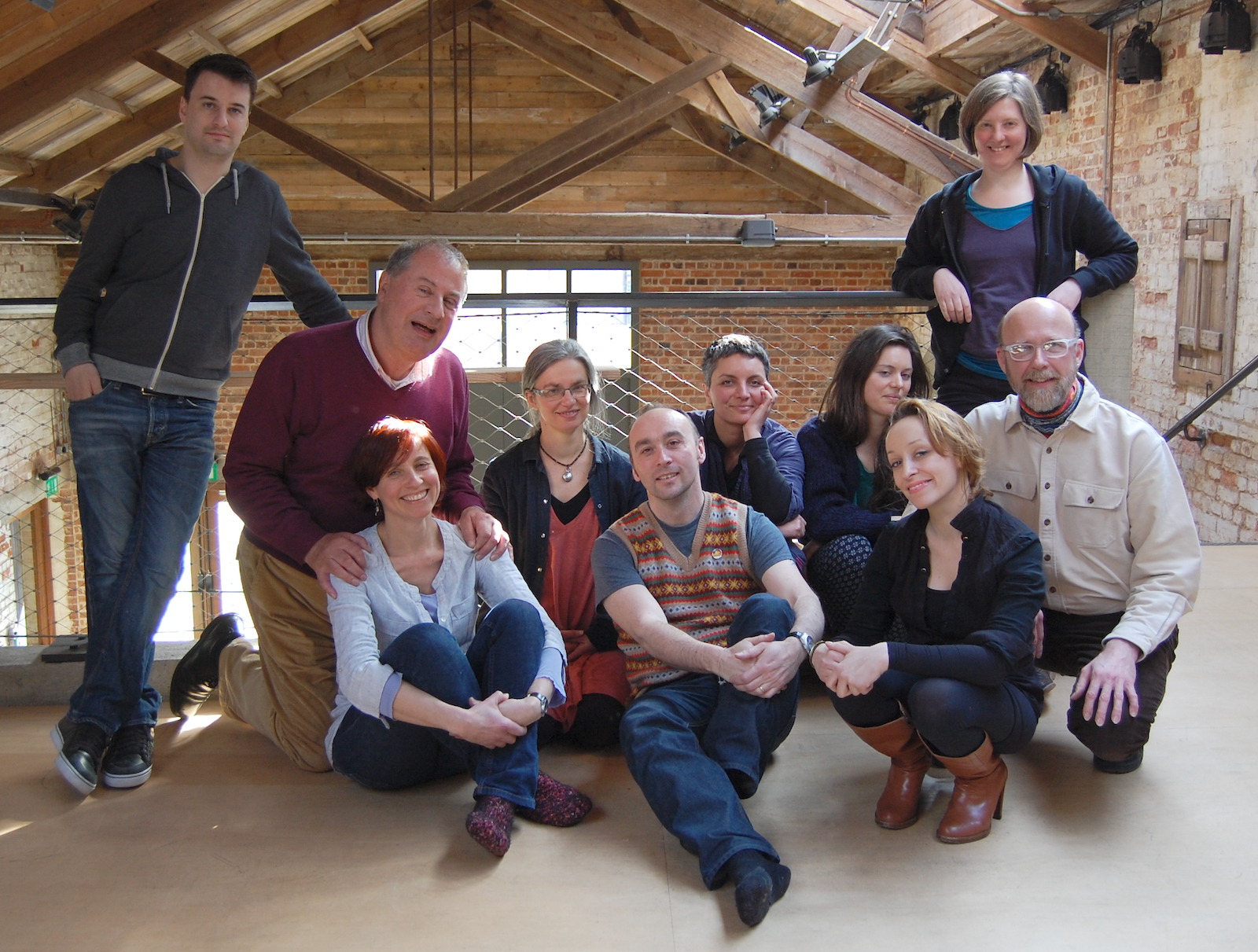
Jim Moray, James Bowman, Clare Salaman, Susanna Pell, David McGuinness, Pamela Thorby, Olivia Chaney, Ana Silvera, Alison McGillivray, Bill Taylor
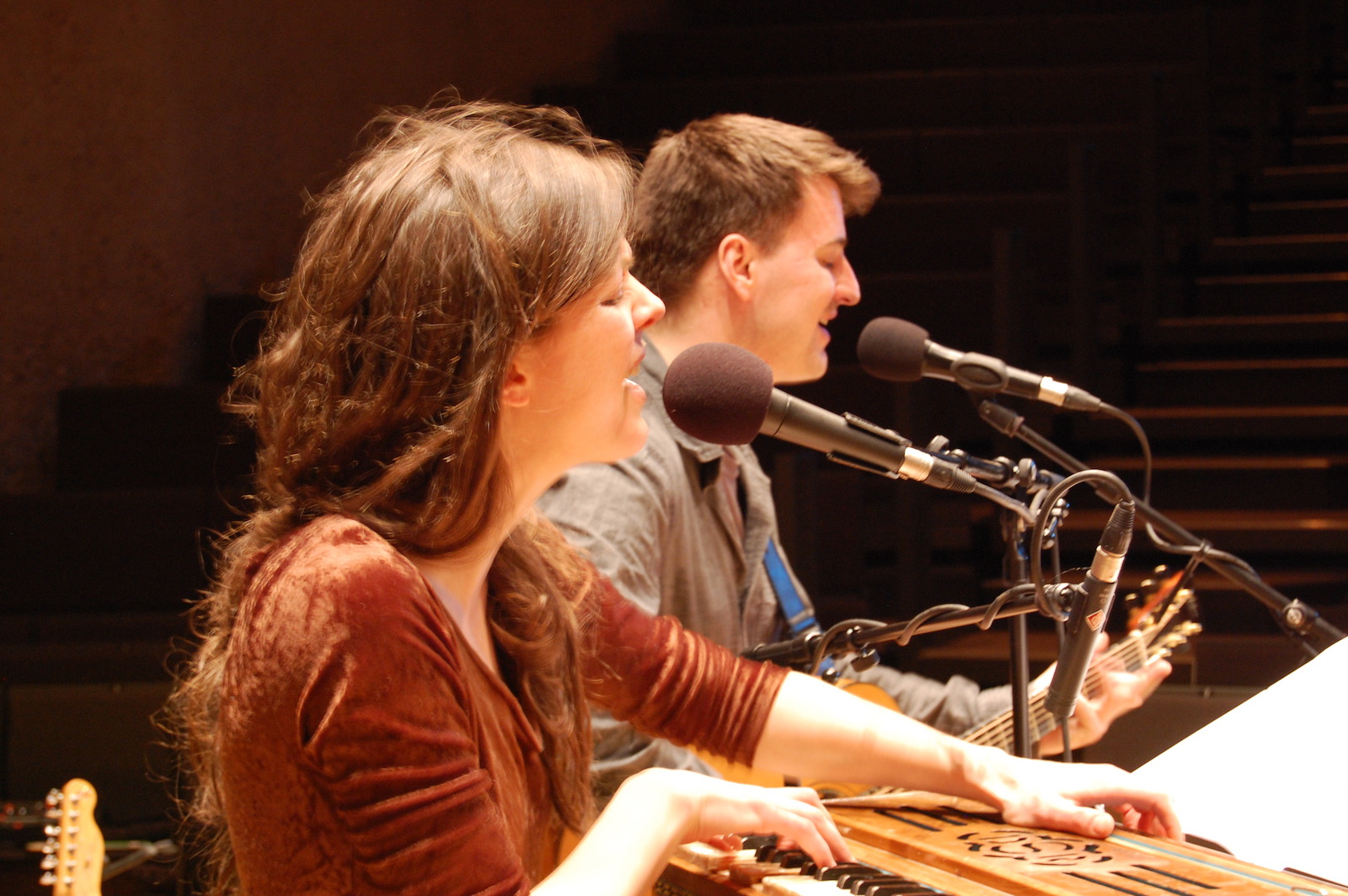
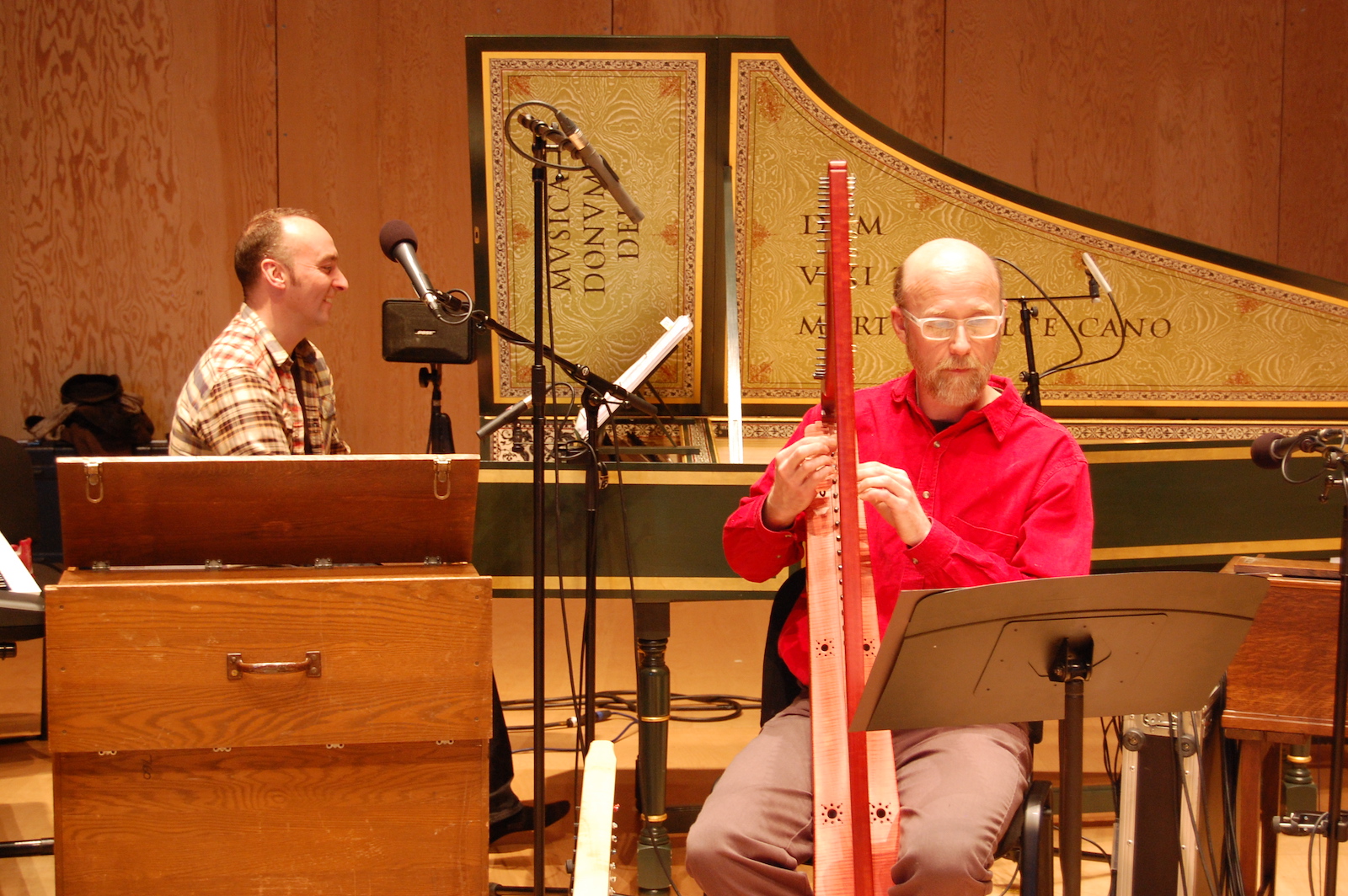
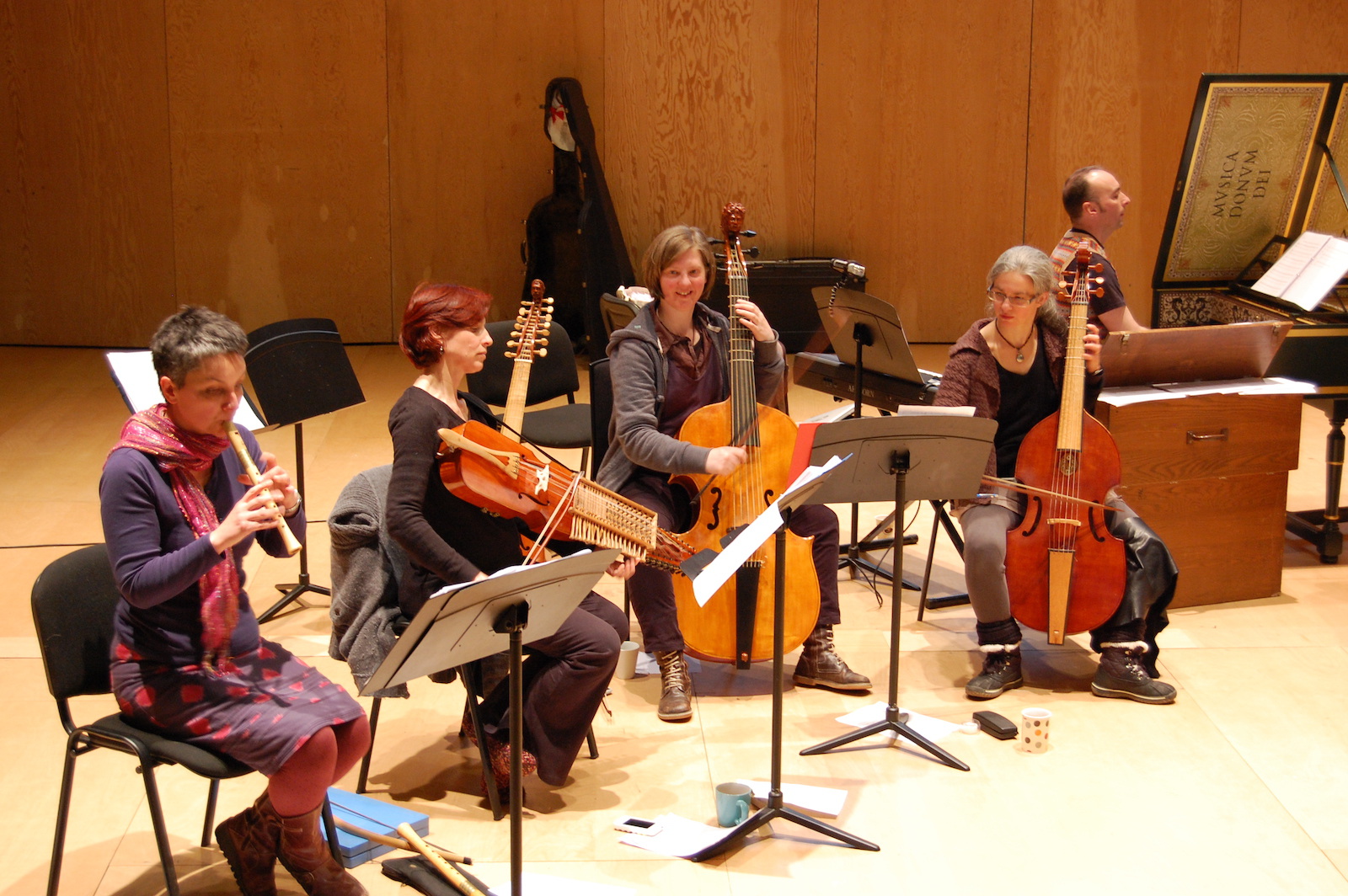
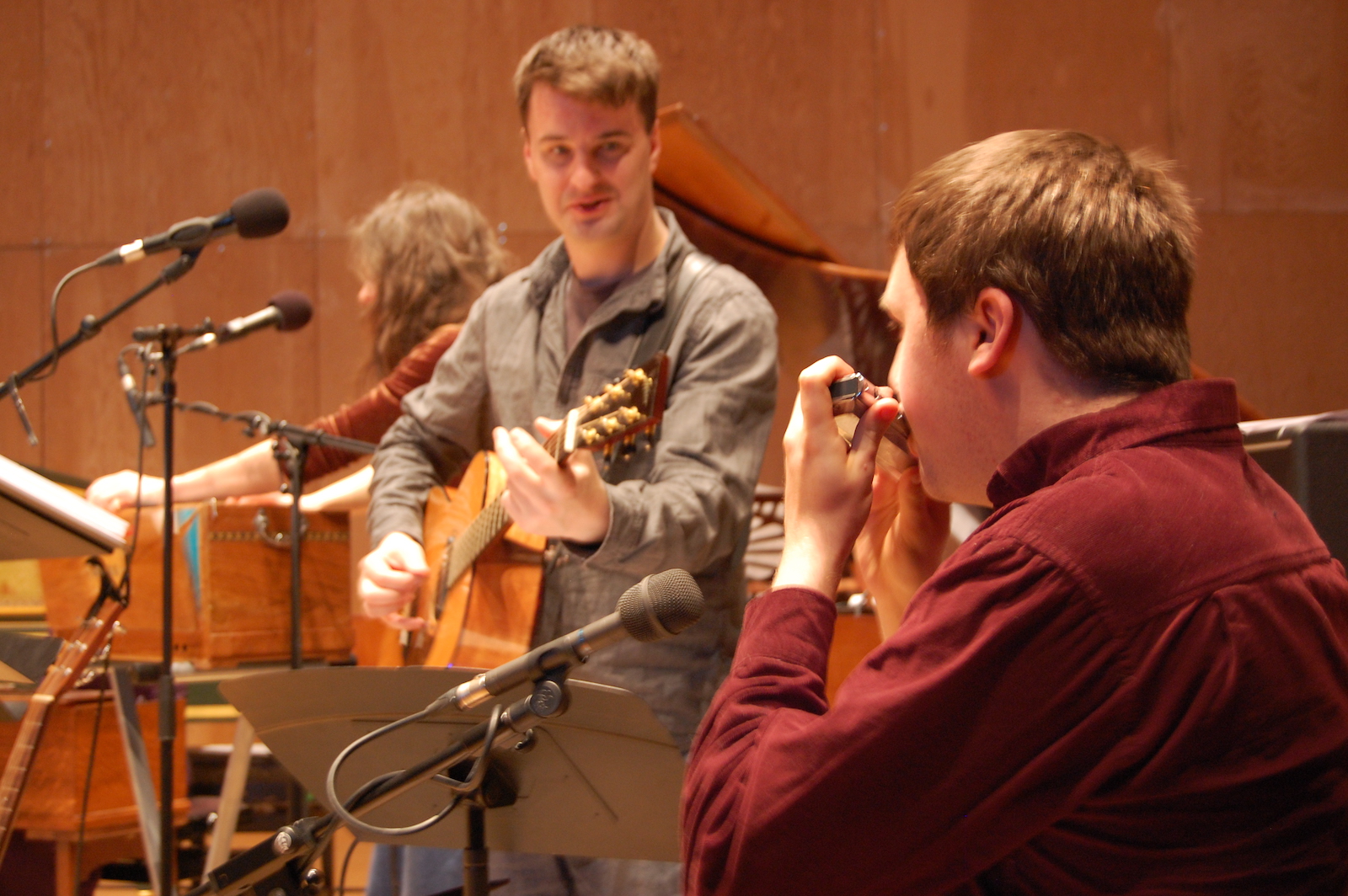
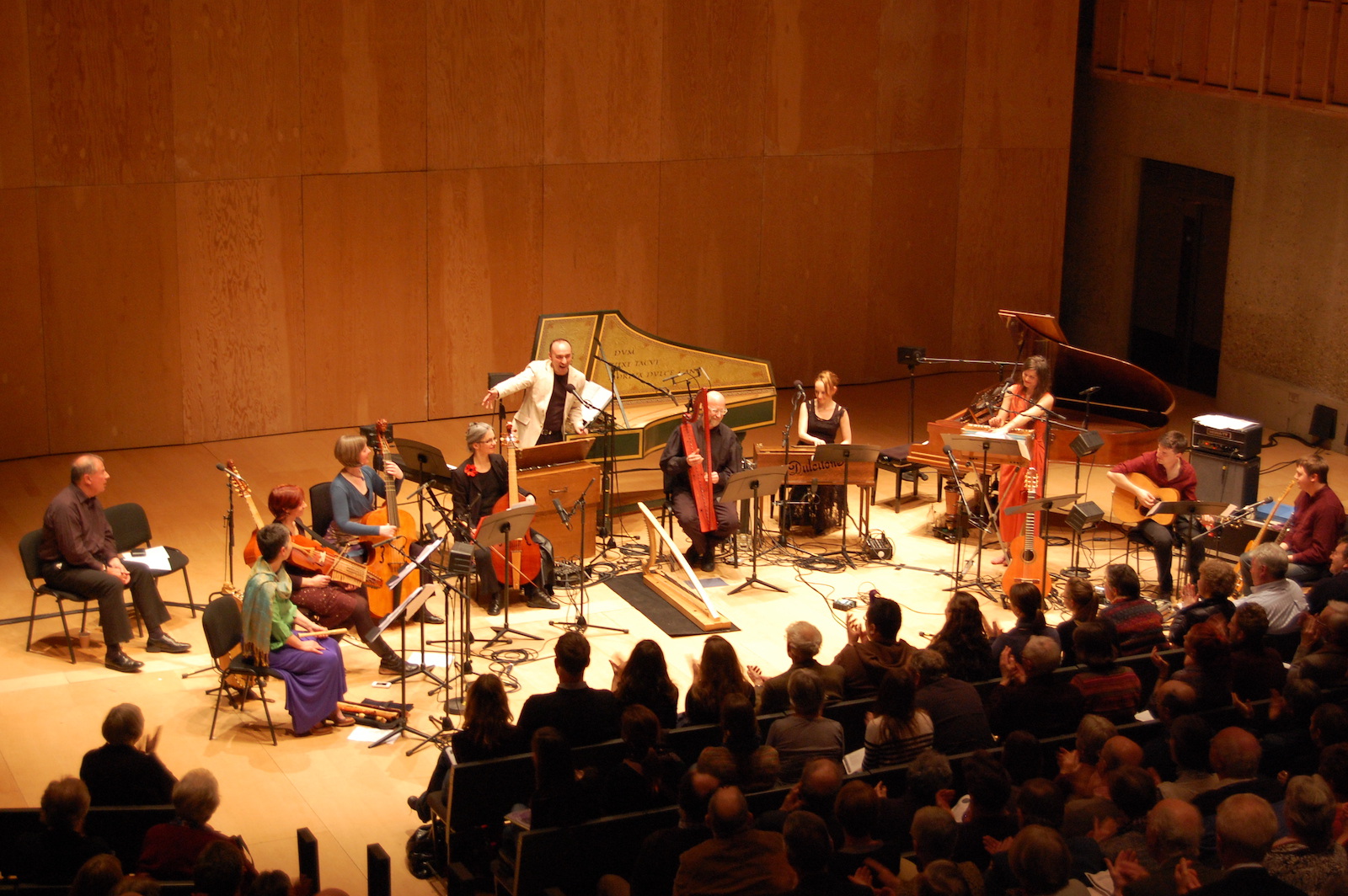
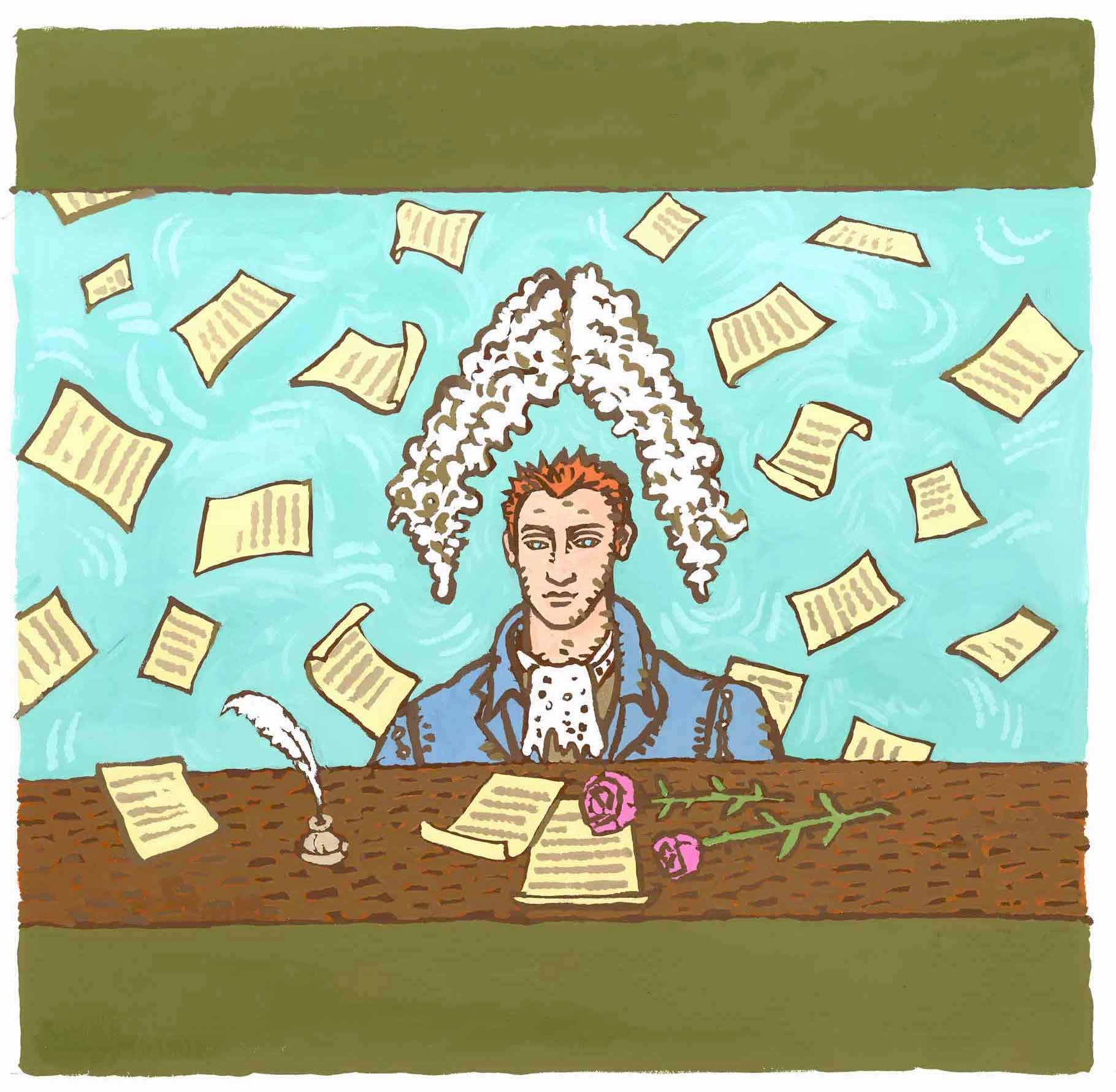
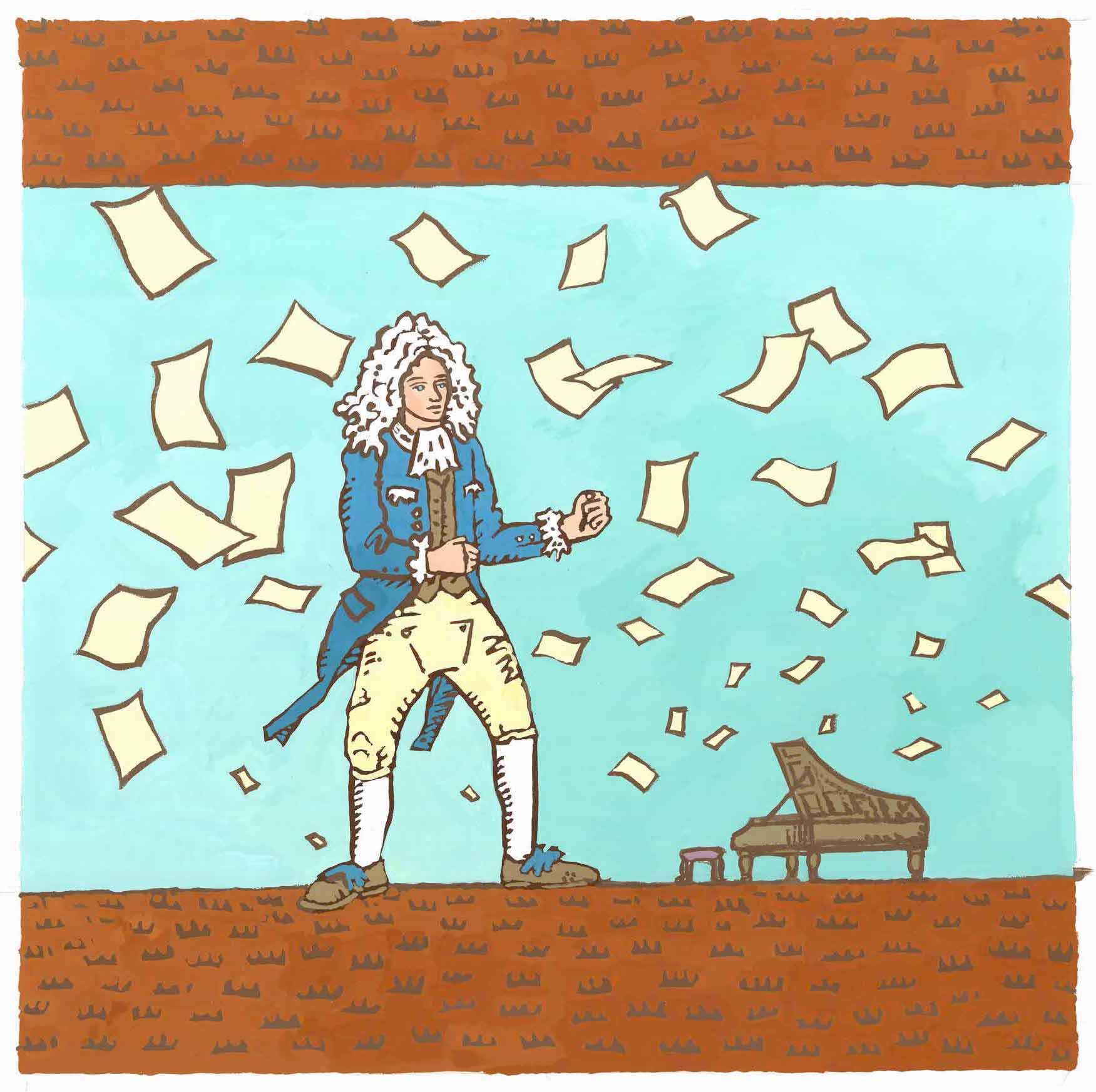
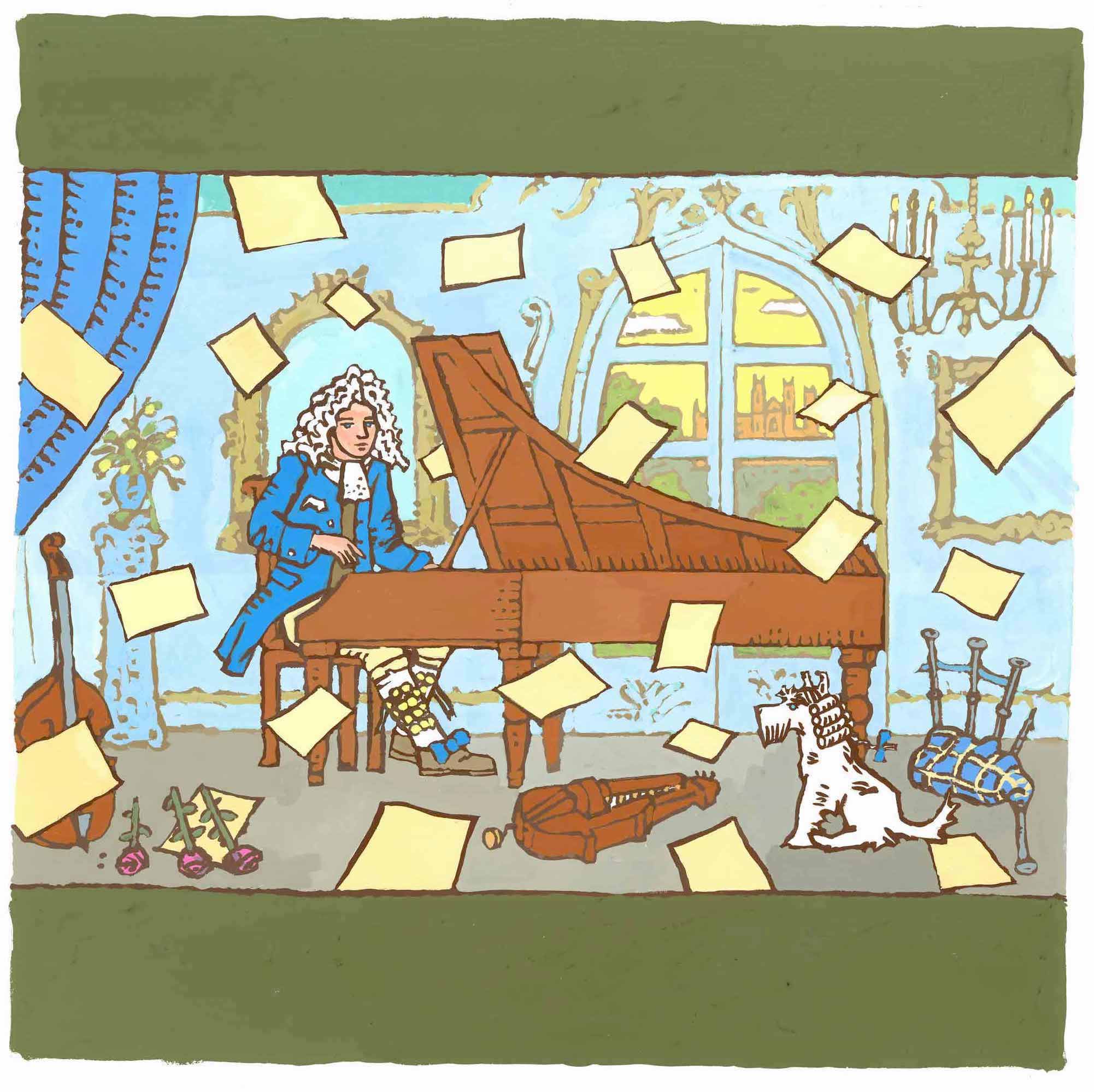
![]() To say that Concerto Caledonia's album veers between maddening and utterly joyous is to put them well ahead of the curve.
To say that Concerto Caledonia's album veers between maddening and utterly joyous is to put them well ahead of the curve.![]()
Alexandra Coghlan, Gramophone July 2015
![]() This is perhaps one of the most singular recordings to have crossed this writer's desk in the last twenty years I have been reviewing CDs. Quirky yes, but also full of life, energy and accessible to all comers. Though it is full of early music, it also has modern instruments, settings, arrangements and original texts and music. Does it all work? Yes indeed, the quality is consistently captivating. This recording obliterates the notion that early music is a stuffy and or academic exercise. Give it a listen.
This is perhaps one of the most singular recordings to have crossed this writer's desk in the last twenty years I have been reviewing CDs. Quirky yes, but also full of life, energy and accessible to all comers. Though it is full of early music, it also has modern instruments, settings, arrangements and original texts and music. Does it all work? Yes indeed, the quality is consistently captivating. This recording obliterates the notion that early music is a stuffy and or academic exercise. Give it a listen.![]()
Toronto Early Music Newsletter June 2015
![]() ★★★★☆ There’s not a swain on the plain when Purcell meets the folkies.
★★★★☆ There’s not a swain on the plain when Purcell meets the folkies.
Once you accept music as a living, breathing language, and that there’s a big difference between restoration and renovation, you can really let your hair down and have some fun. As Concerto Caledonia’s director David McGuinness writes in the booklet accompanying this thoroughly entertaining follow-up to their equally irreverent 2011 take on Britten’s folksong arrangements Revenge of the Folksingers, “there’s almost a generally accepted international style in which to play baroque music, an idea which would have seemed preposterous in the musically diverse Europe of the 17th and 18th centuries.”
As with the earlier CD, Purcell’s Revenge is based on a live gig, and Concerto Caledonia (whose lineup includes early music luminaries like recorder player Pamela Thorby and Alison McGillivray on gamba), again teams up with folk musicians. Countertenor legend James Bowman is thrown in for good measure.
The repertoire ranges from arrangements of Purcell faves such as the Rondeau from Abdelazer, Sweeter than Roses and Fairest Isle to Purcell-inspired originals such as Chaney’s Cassiopeia and Silvera’s Halos. Despite mixed results – I was more convinced by Jim Moray’s electric guitar than his vocal abilities – the overall effect is intoxicating. But the highlight must be Chaney’s utterly exquisite arrangement and performance of There’s not a Swain on the Plain. I have yet to take this track off 'repeat'.![]()
Warwick Arnold, Limelight Magazine (AUS)
![]() "It's always good to question our assumptions about performance of historical music," says David McGuinness, director of Scotland's rambunctious early music consort Concerto Caledonia. A few years back ConCal did a project in which folk singers such as Alasdair Roberts and Olivia Chaney wrapped earthy vocal hues around folk-song settings by Benjamin Britten. The result, Revenge of the Folksingers, was musically illuminating and great fun. Now ConCal has recorded a sequel, Purcell's Revenge, this time looking at the composer who so deeply inspired Britten. There is sultry singing from Chaney and Ana Silvera, and gutsy playing by the instrumental crew. But it's not all grit and sawdust; countertenor James Bowman gives a refined take on Sweeter than Roses and Jim Moray provides an eerily straight rendition of Fairest Isle. Stylistically it's a motley cross-section, which makes it exactly right. In his own lifetime Purcell's music was sung and played by all manner of musicians, Why not now?
"It's always good to question our assumptions about performance of historical music," says David McGuinness, director of Scotland's rambunctious early music consort Concerto Caledonia. A few years back ConCal did a project in which folk singers such as Alasdair Roberts and Olivia Chaney wrapped earthy vocal hues around folk-song settings by Benjamin Britten. The result, Revenge of the Folksingers, was musically illuminating and great fun. Now ConCal has recorded a sequel, Purcell's Revenge, this time looking at the composer who so deeply inspired Britten. There is sultry singing from Chaney and Ana Silvera, and gutsy playing by the instrumental crew. But it's not all grit and sawdust; countertenor James Bowman gives a refined take on Sweeter than Roses and Jim Moray provides an eerily straight rendition of Fairest Isle. Stylistically it's a motley cross-section, which makes it exactly right. In his own lifetime Purcell's music was sung and played by all manner of musicians, Why not now?![]()
Kate Molleson, The Big Issue March 2015
![]() David McGuinness' Concerto Caledonia has a gift for springing anarchic surprises on the listener, In Purcell's Revenge, they take some of the 17th century Restoration composer's music, mix in a few Caledonian trifles by James Oswald, and serve it up in a hybrid sauce that will appeal equally to both classical and folk tastes. Take the well-known An Evening Hymn, for instance, robbed of its ground bass to reveal a beguiling ballade, ravishingly sung and arranged by Ana Silvera. Electric guitars appear beside harps, recorders and harpsichords, there's unadorned Purcell in the famous Rondeau from Abdelazer, and an appropriate bit of Purcellian smut in Aminta one night had occasion to piss, again tastefully arranged by McGuinness. Highly entertaining.
David McGuinness' Concerto Caledonia has a gift for springing anarchic surprises on the listener, In Purcell's Revenge, they take some of the 17th century Restoration composer's music, mix in a few Caledonian trifles by James Oswald, and serve it up in a hybrid sauce that will appeal equally to both classical and folk tastes. Take the well-known An Evening Hymn, for instance, robbed of its ground bass to reveal a beguiling ballade, ravishingly sung and arranged by Ana Silvera. Electric guitars appear beside harps, recorders and harpsichords, there's unadorned Purcell in the famous Rondeau from Abdelazer, and an appropriate bit of Purcellian smut in Aminta one night had occasion to piss, again tastefully arranged by McGuinness. Highly entertaining.![]()
Ken Walton, The Scotsman, 14 March 2015
![]() If, like me, you have a resistance to the fruitier type of English singer with perfectly rounded Etonian vowels and a faintly snooty intonation, you will warm like butter on a tea-cake to this Scottish assault on a precious English heirloom. Henry Purcell (1659-95) was a lad from the rough side of London. His songs, in the commonly-used modern settings by Benjamin Britten, sound altogether too polite.
If, like me, you have a resistance to the fruitier type of English singer with perfectly rounded Etonian vowels and a faintly snooty intonation, you will warm like butter on a tea-cake to this Scottish assault on a precious English heirloom. Henry Purcell (1659-95) was a lad from the rough side of London. His songs, in the commonly-used modern settings by Benjamin Britten, sound altogether too polite.
Taken apart here by Concerto Caledonia, they revert to street food, accompanied on period instruments and reconnected to Scottish balladry. The voices are strictly folk club, far from the opera house, and all the lovelier for their earthiness.
'Fairest Isle', an art-song so iconic that the BBC named an English music year after it, is tossed off without a trace of sentiment. 'One Charming Night' from The Fairy Queen gets a quasi-rock intro and a bordello delivery. 'Music for a While' comes over as a ditty you might growl out over a sink full of washing-up. 'Aminta One Night had Occasion to Piss' could hardly be more expressive of an equally common domestic activity.
The restoration of Purcell to street level becomes a tad monotonous before the disc is done and some of the composer’s flights of fancy are lost in the descent. But if, like me, you are fed up with upper-deck Purcell, this will serve as a refreshing corrective to soft-soap Peter Pears and his too-precious successors. It’s irreverent, a bit dirty and a lot more fun than decent.![]()
Norman Lebrecht, Sinfini Music
